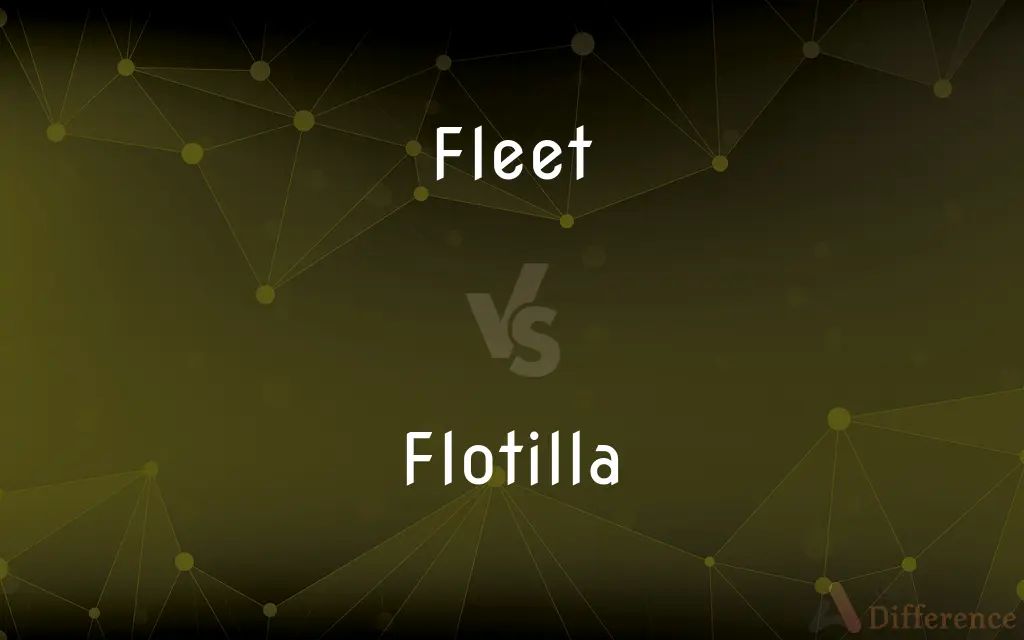Fleet vs. Flotilla — What's the Difference?
By Maham Liaqat & Urooj Arif — Updated on April 3, 2024
Fleet refers to a large group of ships, vehicles, or aircraft operated together, typically under a single ownership or command. Flotilla, while also a grouping of ships, denotes a smaller or more tactical assembly, often part of a larger fleet.

Difference Between Fleet and Flotilla
Table of Contents
ADVERTISEMENT
Key Differences
A fleet represents a large grouping of naval vessels, or similarly, vehicles or aircraft, that operate together under a unified command for broader strategic purposes. Fleets are often associated with significant naval power and can include a variety of ship types, including aircraft carriers, destroyers, and support vessels. On the other hand, a flotilla is a smaller unit within a fleet, composed of several ships of similar type or function, focused on more specific tactical missions. A flotilla might operate independently for specific tasks but remains part of the larger strategic context of the fleet.
Fleets are typically structured according to their purpose, such as combat, support, or transportation, encompassing a wide range of vessel types to fulfill these roles. They are pivotal in demonstrating and projecting naval strength over vast oceanic areas. Whereas flotillas are more homogenous, consisting of ships of a similar kind, like torpedo boats or submarines, tasked with specific operational goals, such as patrolling, mine laying, or anti-submarine warfare.
The command hierarchy within a fleet is more complex, given its size and the variety of missions it can undertake. It is usually led by a high-ranking officer with a vast apparatus for logistical, operational, and tactical support. In contrast, a flotilla is commanded by a lower-ranking officer, given its smaller size and more focused mission scope. This makes flotilla command structures relatively simpler and more agile in decision-making.
Operational flexibility is a key characteristic of a fleet, enabling it to engage in a wide range of naval operations across global theaters. This flexibility is supported by the fleet's comprehensive makeup, allowing it to adapt to various strategic needs and threats. Meanwhile, a flotilla’s operational flexibility is more specialized, focusing on executing specific tasks effectively within the broader strategy laid out by the fleet command.
In terms of strategic significance, fleets are crucial for asserting naval dominance, securing sea lanes of communication, and supporting national interests across oceans. They embody the naval power of a nation. Flotillas, while integral to these broader objectives, play a more focused role in strategic operations, such as surveillance, coastal defense, and targeted offensive operations within a confined area.
ADVERTISEMENT
Comparison Chart
Size
Large, consisting of numerous ships
Smaller, composed of a few ships
Purpose
Broad strategic operations
Specific tactical missions
Command
Led by high-ranking officers; complex hierarchy
Commanded by lower-ranking officers; simpler structure
Flexibility
Operational across a wide range of missions
Specialized in particular tasks
Strategic Role
Asserts naval dominance and secures sea lanes
Supports specific objectives within larger strategy
Compare with Definitions
Fleet
A large group of ships sailing together, engaged in the same activity, or under the same ownership.
The merchant fleet transports goods across global trade routes.
Flotilla
A small fleet of ships, especially naval vessels.
A flotilla of patrol boats guarded the harbor.
Fleet
(Archaic) To move or pass swiftly.
The fleet-footed messenger delivered the urgent news by nightfall.
Flotilla
An organized group of warships assigned to a specific task.
The anti-submarine flotilla played a crucial role in naval operations.
Fleet
The entirety of a country's naval warships.
The national fleet was mobilized in response to the crisis.
Flotilla
A formation of small naval vessels.
The flotilla maneuvered through the narrow straits undetected.
Fleet
A group of vehicles or aircraft operating together or under the same management.
The company's fleet of delivery trucks is essential for its logistics.
Flotilla
(Historical) A division of the Spanish treasure fleet.
The flotilla carried precious metals from the New World to Spain.
Fleet
To fade or disappear gradually.
As the day progressed, the morning fog began to fleet away.
Flotilla
A flotilla (from Spanish, meaning a small flota (fleet) of ships), or naval flotilla, is a formation of small warships that may be part of a larger fleet.
Fleet
A number of warships operating together under one command.
Flotilla
A small fleet.
Fleet
A number of vessels having a shared origin, purpose, or area of operation
The Japanese merchant fleet.
The North Pacific fishing fleet.
Flotilla
A fleet of small craft.
Fleet
A group of vehicles, such as taxicabs or airliners, owned or operated as a unit.
Flotilla
A naval unit consisting of two or more squadrons of small warships.
Fleet
Moving swiftly and nimbly. ]
Flotilla
(Informal) A group of vehicles owned or operated as a unit
A flotilla of limousines.
Fleet
A group of vessels or vehicles.
Flotilla
(nautical) A small fleet of warships (usually of the same class), or a fleet of small ships.
Fleet
Any group of associated items.
Flotilla
A little fleet, or a fleet of small vessels.
Fleet
A large, coordinated group of people.
Flotilla
A United States Navy fleet consisting of two or more squadrons of small warships
Fleet
(nautical) A number of vessels in company, especially war vessels; also, the collective naval force of a country, etc.
Flotilla
A fleet of small craft
Fleet
Any command of vessels exceeding a squadron in size, or a rear admiral's command, composed of five sail-of-the-line, with any number of smaller vessels.
Fleet
An arm of the sea; a run of water, such as an inlet or a creek.
Fleet
(nautical) A location, as on a navigable river, where barges are secured.
Fleet
(Yorkshire) flet
Fleet
To float.
Fleet
(ambitransitive) To pass over rapidly; to skim the surface of.
Fleet
(ambitransitive) To hasten over; to cause to pass away lightly, or in mirth and joy.
Fleet
(intransitive) To flee, to escape, to speed away.
Fleet
(intransitive) To evanesce, disappear, die out.
Fleet
(nautical) To move up a rope, so as to haul to more advantage; especially to draw apart the blocks of a tackle.
Fleet
To move or change in position.
Fleet
To shift the position of dead-eyes when the shrouds are become too long.
Fleet
To cause to slip down the barrel of a capstan or windlass, as a rope or chain.
Fleet
To take the cream from; to skim.
Fleet
(literary) Swift in motion; light and quick in going from place to place.
Fleet
(uncommon) Light; superficially thin; not penetrating deep, as soil.
Fleet
To sail; to float.
And in frail wood on Adrian Gulf doth fleet.
Fleet
To fly swiftly; to pass over quickly; to hasten; to flit as a light substance.
All the unaccomplished works of Nature's hand, . . . Dissolved on earth, fleet hither.
Fleet
To slip on the whelps or the barrel of a capstan or windlass; - said of a cable or hawser.
Fleet
To move or change in position; - said of persons; as, the crew fleeted aft.
Fleet
To pass over rapidly; to skin the surface of; as, a ship that fleets the gulf.
Fleet
To hasten over; to cause to pass away lighty, or in mirth and joy.
Many young gentlemen flock to him, and fleet the time carelessly.
Fleet
To draw apart the blocks of; - said of a tackle.
Fleet
To cause to slip down the barrel of a capstan or windlass, as a rope or chain.
Fleet
To move or change in position; used only in special phrases; as, of fleet aft the crew.
We got the long "stick" . . . down and "fleeted" aft, where it was secured.
Fleet
To take the cream from; to skim.
Fleet
Swift in motion; moving with velocity; light and quick in going from place to place; nimble.
In mail their horses clad, yet fleet and strong.
Fleet
Light; superficially thin; not penetrating deep, as soil.
Fleet
A number of vessels in company, especially war vessels; also, the collective naval force of a country, etc.
Fleet
A flood; a creek or inlet; a bay or estuary; a river; - obsolete, except as a place name, - as Fleet Street in London.
Together wove we nets to entrap the fishIn floods and sedgy fleets.
Fleet
A former prison in London, which originally stood near a stream, the Fleet (now filled up).
Fleet
Group of aircraft operating together under the same ownership
Fleet
Group of motor vehicles operating together under the same ownership
Fleet
A group of steamships operating together under the same ownership
Fleet
A group of warships organized as a tactical unit
Fleet
Move along rapidly and lightly; skim or dart
Fleet
Disappear gradually;
The pain eventually passed off
Fleet
Moving very fast;
Fleet of foot
The fleet scurrying of squirrels
A swift current
Swift flight of an arrow
A swift runner
Common Curiosities
Can a flotilla operate independently of a fleet?
Yes, a flotilla can operate independently for specific missions but is generally part of a larger fleet.
How many ships make up a flotilla?
The number can vary, but typically a flotilla is made up of a few to several ships of similar type.
Are all naval ships part of a fleet?
Most naval ships operate as part of a fleet, although some may be assigned to specific flotillas for certain tasks.
Can the term "fleet" apply to non-naval groups?
Yes, "fleet" can refer to groups of vehicles or aircraft, in addition to naval ships.
What is the primary purpose of a fleet?
The primary purpose is to conduct broad strategic operations, including combat, support, and transportation.
Can a flotilla contain different types of ships?
Generally, flotillas consist of similar types of ships focused on a specific tactical mission.
What role does a flotilla play in naval strategy?
Flotillas carry out specific tactical missions within the broader strategic objectives of the fleet.
Are fleets always made up of ships?
Primarily, but the term can also apply to groups of vehicles or aircraft.
What distinguishes a fleet from a flotilla in terms of command?
Fleets have a more complex command hierarchy and are led by higher-ranking officers than flotillas.
How does the operational flexibility of a fleet compare to that of a flotilla?
Fleets have greater operational flexibility, capable of a wide range of missions, while flotillas are specialized.
How is the strategic significance of a fleet manifested?
Through naval dominance, protection of sea lanes, and support of national interests across oceans.
What is the historical significance of flotillas?
Flotillas have played key roles in naval operations, including defense, patrol, and targeted attacks.
How are new technologies impacting fleet and flotilla operations?
Advances in technology are enhancing the operational capabilities, efficiency, and strategic reach of both fleets and flotillas.
How does the size of a fleet affect its operational capabilities?
The larger size of a fleet enhances its capability to undertake a variety of strategic and operational missions.
Can the structure of a flotilla change based on its mission?
Yes, the composition and structure of a flotilla can be adapted to meet specific operational requirements.
Share Your Discovery

Previous Comparison
Cop vs. Spider
Next Comparison
Vendor vs. ApplicationAuthor Spotlight
Written by
Maham LiaqatCo-written by
Urooj ArifUrooj is a skilled content writer at Ask Difference, known for her exceptional ability to simplify complex topics into engaging and informative content. With a passion for research and a flair for clear, concise writing, she consistently delivers articles that resonate with our diverse audience.














































